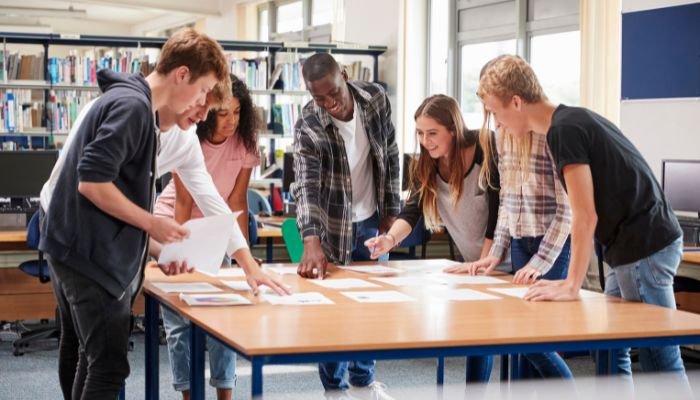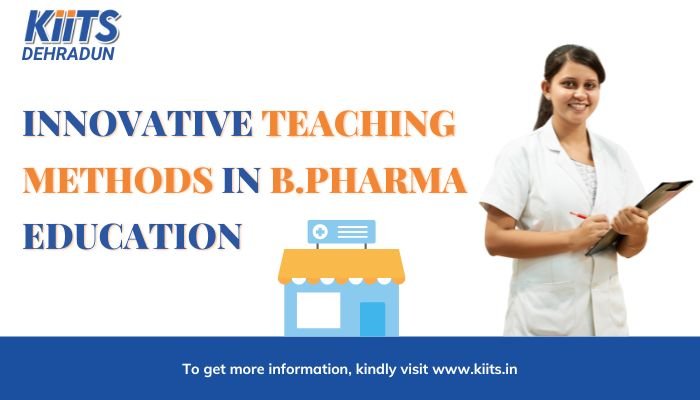The rapidly advancing pharmaceutical sciences and the growing complexity of healthcare delivery are causing substantial changes in the landscape of B.Pharma education. Even though they are fundamental, traditional lecture-based teaching techniques are no longer adequate to address the changing needs of pharmacy students. Because of this, educators are investigating and putting into practice cutting-edge teaching strategies to improve the educational process and better equip students for their future employment. This paper examines a number of these approaches and how they affect B.Pharma education.
Engaged Education

Rather than having students passively absorb knowledge, active learning is a student-centered method that requires actively involving them in the learning process. Active learning incorporates strategies including case studies, group discussions, and problem-based learning (PBL). Through the application of theoretical information to real-world situations, these teaching strategies in B.Pharma education promote critical thinking and problem-solving abilities in students.
Problem Based Learning (PBL):
In PBL, students collaborate to discover a solution to an issue that is connected to pharmacy practice. This approach improves their comprehension of the material while also fostering their ability to collaborate and communicate with others. In a PBL session, for example, students may be required to integrate knowledge from multiple courses in order to build a treatment plan for a patient with a complex medical history.
The Turned Classroom

Through the use of video lectures and readings, the flipped classroom model subverts the conventional classroom setting by offering educational information outside of scheduled class time. After that, class time is devoted to interactive exercises, debates, and application-based learning. With this method, students can learn at their own speed and more classroom time can be dedicated to in-depth topic exploration.
The flipped classroom model can be very beneficial for B.Pharma education like medicinal chemistry and pharmacology. Students can study the lecture notes at their own pace and arrive at class ready to participate in group projects, case study analysis, or practical laboratory work. This gives them real-world experience in addition to solidifying their academic knowledge.
Learning Through Simulation
Simulators and virtual environments are used in simulation-based learning to replicate real-world situations. This approach is particularly beneficial for pharmacy education, as practical experience is essential. Simple computer-based models to intricate virtual reality environments that imitate healthcare settings are examples of simulations.
Pharmacy students, for instance, can practise patient counselling, managing drug interactions, and distributing prescriptions by using simulation software. Before working with actual patients, students can refine their skills in a safe and controlled environment with these simulators. Furthermore, clinical skills and bedside manners can be taught using high-fidelity mannequins and simulated patients.
Interprofessional Education (IPE) for B.Pharma Education
Learning alongside students from other healthcare specialties, such as medicine, nursing, and physiotherapy, is known as interprofessional education, or IPE. This cooperative approach prepares pharmacy students to function well in group environments and reflects the multidisciplinary nature of contemporary healthcare.
IPE can be incorporated into B.Pharma education through collaborative lectures, case studies, and clinical rotations with students from various healthcare specialties. Pharmacy students gain better communication and teamwork skills as well as an understanding of the duties and responsibilities of various healthcare providers from this exposure. In a collaborative case study, for example, a pharmacy student might collaborate with medical and nursing students to create a thorough treatment plan for a patient.
Technology-( Teaching Methods )
The teaching method they using is technology in the classroom has created new opportunities to improve the educational process. Technology can be used in B.Pharma education in a number of ways, such as through mobile applications, virtual labs, and online learning platforms.
Mobile Applications:
Students can easily access medication databases, medical calculators, and interactive learning modules with the use of mobile apps created specifically for pharmacy education. Pharmacy students prefer using apps like Lexicomp and Epocrates for study and quick reference.
Virtual Lab:
Students can perform experiments and practise laboratory procedures in a simulated setting by using virtual labs. These laboratories can be used in addition to in-person lab sessions to provide students more chances to develop and solidify their skills. For instance, a virtual lab may replicate the process of compounding a pharmaceutical preparation, giving trainees the freedom to practise the technique again without being limited by actual resources.
Gamification

Gamification is the technique of adding gaming aspects to the educational process in order to boost motivation and engagement. Gamification in B.Pharma education can take the shape of interactive modules, tournaments, and quizzes that enhance the fun and engagement of learning.
As an example, a competitive quiz game regarding pharmacological mechanisms and negative consequences might be included in a pharmacology course. Students would score points for accurately answering these kind of questions. Leader boards and prizes are additional tools for encouraging involvement and creating a sense of success. By encouraging participation and repetition, this teaching method not only makes learning more enjoyable but also helps in the reinforcement of important ideas.
FAQS
Q1: How is the flipped classroom model implemented in B.Pharma education, and what is it?
A1: The flipped classroom model is a cutting-edge approach to education in which class time is devoted to interactive activities by delivering instructional content outside of the classroom, usually through texts and video lectures. This strategy is used in B.Pharma education by assigning students to read lecture materials independently before participating in practical laboratory work, case study analysis, or group projects in class. This teaching method offers both practical experience and reinforcement of academic knowledge, especially in areas like medicinal chemistry and pharmacology.
Q2: How does B.Pharma education is improved by problem-based learning (PBL)?
A2: Students use problem-based learning (PBL), an active learning approach, to solve real-world problems by working together to develop answers. PBL improves learning in B.Pharma education by allowing students to apply theoretical knowledge to real-world situations, which develops their capacity for critical thought, problem-solving, and collaboration. For example, using their knowledge from multiple courses, students might create a treatment plan for a patient with a complicated medical history.
Q3: How is simulation-based learning incorporated into B.Pharma educational programmes?
A3: Students can practise their abilities in a secure and controlled environment by using simulators or virtual environments that replicate real-life scenarios. This approach is essential for providing practical experience in B.Pharma education. Pharmacy students, for instance, can practise patient counselling, managing drug interactions, and distributing prescriptions by using simulation software. In order to prepare students for interactions with people in the real world, high-fidelity mannequins and simulated patients can also be utilised to teach clinical skills and enhance bedside manner.
Q4: Why is active learning favoured in B.Pharm education over conventional lecture-based methods?
A4: Since active learning involves students directly in the learning process and fosters greater understanding and knowledge retention, it is encouraged in B.Pharm education over traditional lecture-based methods. Methods like case studies, group discussions, and problem-based learning (PBL) help students apply theory to real-world situations, sharpen their critical thinking abilities, and solve problems more effectively. The teamwork and communication that are necessary for professional activity in pharmacy are also fostered via active learning.
In summary
Innovative teaching strategies must be incorporated into B.Pharm curricula in order to properly prepare students for the needs of the contemporary healthcare sector. A few tactics that can revolutionise education include gamification, simulation-based learning, flipped classrooms, interprofessional education, active learning, and technology-enhanced learning.
These techniques help students develop their practical skills, critical thinking, and teamwork abilities in addition to their theoretical comprehension. The methods used to train future pharmacists have to evolve along with the pharmacy industry. Teachers may guarantee that B.Pharm graduates are prepared to deliver excellent patient care and advance the pharmaceutical sciences by using these cutting-edge teaching method.








